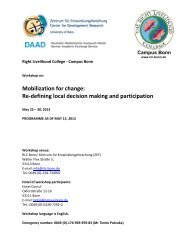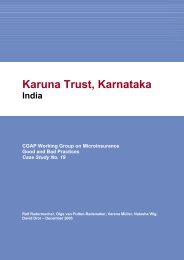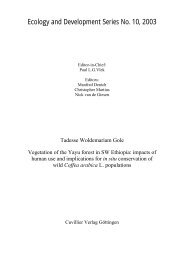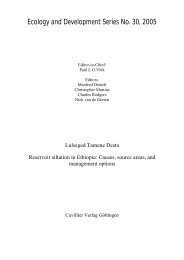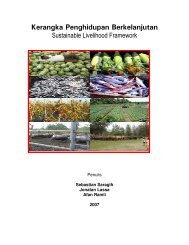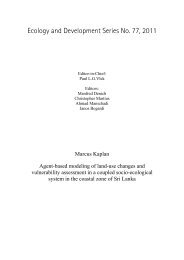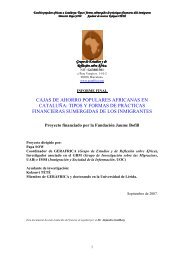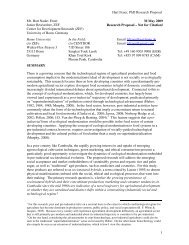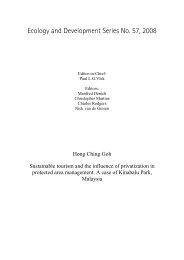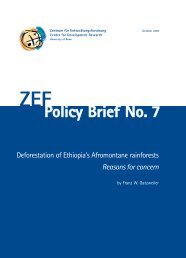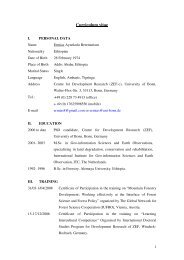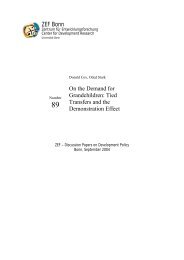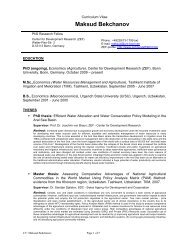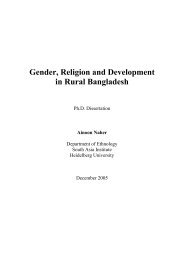ZEF Bonn
ZEF Bonn
ZEF Bonn
You also want an ePaper? Increase the reach of your titles
YUMPU automatically turns print PDFs into web optimized ePapers that Google loves.
influences the farmers' own land-use behaviour. Besides, farmers have to search for<br />
fire-free land use in any case. For legal and political initiatives restricting the use of<br />
fire in land preparation are putting growing pressure on them. Recently, farmers in<br />
the study region were observed collecting plant material to cover the extremely bare<br />
soil in pepper plantations. Perhaps such biomass transfer systems with permanent<br />
land use and mulch produced elsewhere will dominate future land use patterns in<br />
the region. But cutting and chopping of the vegetation on fallowed fields will certainly<br />
not lose its importance in the near future, particularly when land demand<br />
increases. This applies to the project region, but also to many other tropical rainforest<br />
areas world-wide.<br />
3.2 Optimisation of water allocation<br />
in the Volta basin<br />
The goal of the GLOWA Volta project is to develop, in collaboration with our<br />
Ghanaian and Burkinabe partners, a decision-support system to optimise water allocation<br />
within the Volta basin, curbing potential conflicts over this resource.<br />
Understanding the complex relations between the water cycle, climate, and economic<br />
development requires insights from many scientific disciplines. The real challenge<br />
of the GLOWA program is not only to collect information using the various<br />
means and methods of these disciplines, but also, and above all, to tie all this information<br />
together in a meaningful and quantitative way. We identified three integrative<br />
focal points where added value can be gained. In each of these, questions are<br />
answered that cannot be addressed by a single science:<br />
● atmosphere/surface interactions,<br />
● land-use change modelling, and<br />
● water-use optimisation.<br />
At each of these interfaces, scientists<br />
are challenged to collect and<br />
manage their information in a way<br />
and on a scale that enables neighbouring<br />
disciplines to work jointly<br />
with that data and generate additional<br />
information.<br />
Atmosphere/surface interactions<br />
need to be understood to account<br />
for the feedback between climate<br />
and change in land-surface properties.<br />
The extensive efforts to simulate<br />
regional climate change with<br />
the MM5 atmospheric model<br />
depend crucially on the proper<br />
quantification of the effects that<br />
land surface changes have on the<br />
atmosphere. The integrative challenge<br />
is bridging the gap between<br />
meteorology and hydrology. In<br />
communicating with each other<br />
these two disciplines are confron-<br />
Research<br />
The challenge of the GLOWA<br />
program is to tie information<br />
together in a meaningful and<br />
quantitative way. Scientists<br />
need to collect and manage<br />
their information with a view<br />
to enabling neighbouring disciplines<br />
to generate additional<br />
information.<br />
Akasombo dam<br />
and the Volta Lake<br />
37



